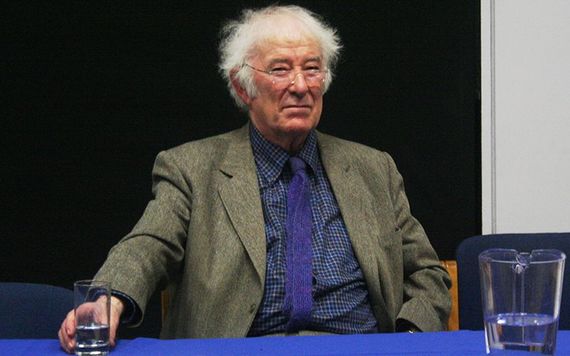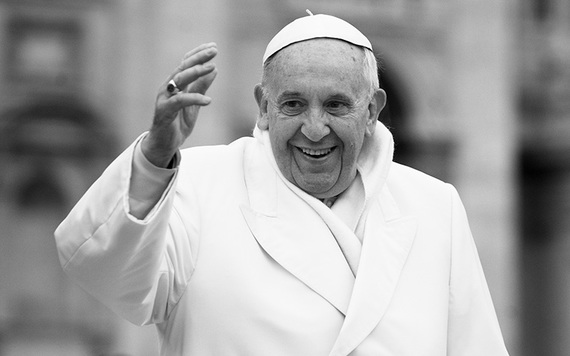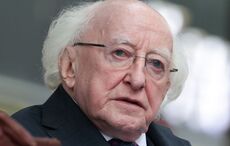Reflections on 2017, life lessons, Trumpland and the “moral authority of love when honored as the guiding principle of life”
The sudden death four years ago of the Nobel Laureate Seamus Heaney evoked a worldwide outpouring of grief. Generally acknowledged as the greatest poet of his time, Seamus (as he was known to everyone) was beloved as much for his down to earth humanity as for the wisdom, honesty and lyrical beauty of his work.
Many of the poems of Seamus are rooted in the timeless legends and folktales of Ireland, including “St. Kevin and the Blackbird,” which was inspired by the fable of a sixth century monk so rapt in prayer that he ignores the presence of a little bird that has landed in his outstretched palm. Finding himself “linked into the network of eternal life,” Kevin allows the bird to nest, lay its eggs and raise a band of fledglings until they are old enough to fly on their own.
In the second half of the poem, Heaney examines the deeper meaning of the fable, suggesting that the power of faith is so strong for Kevin that, through the self-abandonment of prayer, he has achieved a spiritual communion with, “love’s deep river” – a mystical state of consciousness in which
… he has forgotten self, forgotten bird
And on the river bank forgotten the river’s name.
In his 1995 Nobel Address, Heaney noted that the Irish fable upon which the poem is based can be found in many cultures throughout the world, where it functions as a universal challenge to those political orthodoxies that impose artificial borders and barriers between nations and peoples so as to divide them from one another and exert a dominating presence in their lives. The meaning of the fable and Heaney’s poem is that it is only through the power of love that one can achieve so complete an identification with one’s fellow human beings that all artificial boundaries disappear, with suspicion, enmity and warfare being replaced by a universal brotherhood of souls in which life has dignity and purpose.

Irish Nobel winning poet Seamus Heaney.
Clearly, at the time when he wrote “St. Kevin and the Blackbird”, Heaney’s poem had a special meaning for Northern Ireland where deep-rooted sectarian, ethnic and political strife were then tearing it apart. Today, however, the theme is more pertinent to our own country under the reckless “America First” policies of Donald Trump – morally bankrupt policies in which selfishness seems to be the main driver of all behavior towards others. Trump often speaks of his love for his fellow man, but the words ring hollow behind eyes that remain cold to human injustice and suffering.
One of the few voices today with the moral authority needed to combat the rough beasts running wild in Trumpland is Pope Francis. Almost as if he anticipated the destructive forces about to be loosed, in his address to Congress on September 24, 2015, the Pope named four American exemplars of the healing values he was seeking to impart: Abraham Lincoln, the guardian of liberty; Martin Luther King, Jr., a champion of the American dream of equal opportunity; the social activist Dorothy Day; and the Cistercian monk Thomas Merton, who may have been closest to the Pope in his promotion of “peace between people and religions”. Much like Saint Kevin in Heaney’s poem, the goal of Merton’s mission was a transformation of the spirit in which “love takes one’s neighbor as one’s other self”.
________________________________________
Over the past several years, viewers on PBS stations across the country have been excited by a program that celebrates in poetry, music, song, dance and story the Christmas traditions of Ireland and their connection with similar traditions in the American South. One of the most memorable and moving moments of A Southern Celtic Christmas Concert occurs in an interview with Seamus Heaney filmed in the ruins of Glendalough, the hauntingly beautiful monastic setting of “St. Kevin and the Blackbird”. At one point Seamus playfully climbs into the very cell once occupied by the Saint to demonstrate how the miracle with the little bird might have occurred. My four year old grandson was utterly captivated by the scene when he saw it on television. He now wants to visit Glendalough to see if he can entice a bird to land in his own hand!

Pope Francis.
Pope Francis, whose way with children is magical, would love this story, for he understands that it is the radically innocent spirit of children that enables them to respond so easily to a fable like that of St. Kevin and the possibility for hope and renewal represented by the birth of the Christ Child in a manger. As the Pope has said, “Unless you believe, you will not understand.” Children are natural believers—so was Seamus Heaney. To all who knew and benefitted from his generosity, Seamus was a believer with the soul of a child. That was one of the keys to his genius as a man and artist.
Arguably, the essential moral failure of our time is a soul-sickness that stems from a failure of faith in self and others. The antidote to this is nothing more nor less than a belief that humans are not driven primarily by their physical and material needs but by the longings of their souls – a longing expressed through their capacity for love and transcendence. Honoring and indeed celebrating that need has been the great theme of Irish artists throughout the centuries. The result is the miracle of modern Ireland as a psychic triumph in the face of material defeat. If Ireland is today respected throughout the world that is because her artists have taught the Irish people to love their country, its culture and the values it stands for.
The spiritual traditions developed in the monastic communities of Medieval Ireland lie at the heart of A Southern Celtic Christmas Concert and its appeal to PBS viewers. As one viewer was moved to write, “The musicians, the spoken word, the audience participation, the spirit and the overall feeling that God is everywhere – in all of us and in everything we do – created a wonderful entertainment.” This response is all the more powerful because the writer identified himself as Jewish. Pope Francis would applaud the generosity of the sentiment, as would Seamus Heaney, and perhaps even St. Kevin, for what it reflects is the timeless moral authority of love when honored as the guiding principle of life.
* James W. Flannery is a Professor Emeritus at Emory University and was responsible for the Yeats cycle of plays produced at the Abbey Theater in Dublin.
Read more: Trump’s Brit fascist Twitter friend stirs up race hate in Belfast




Comments